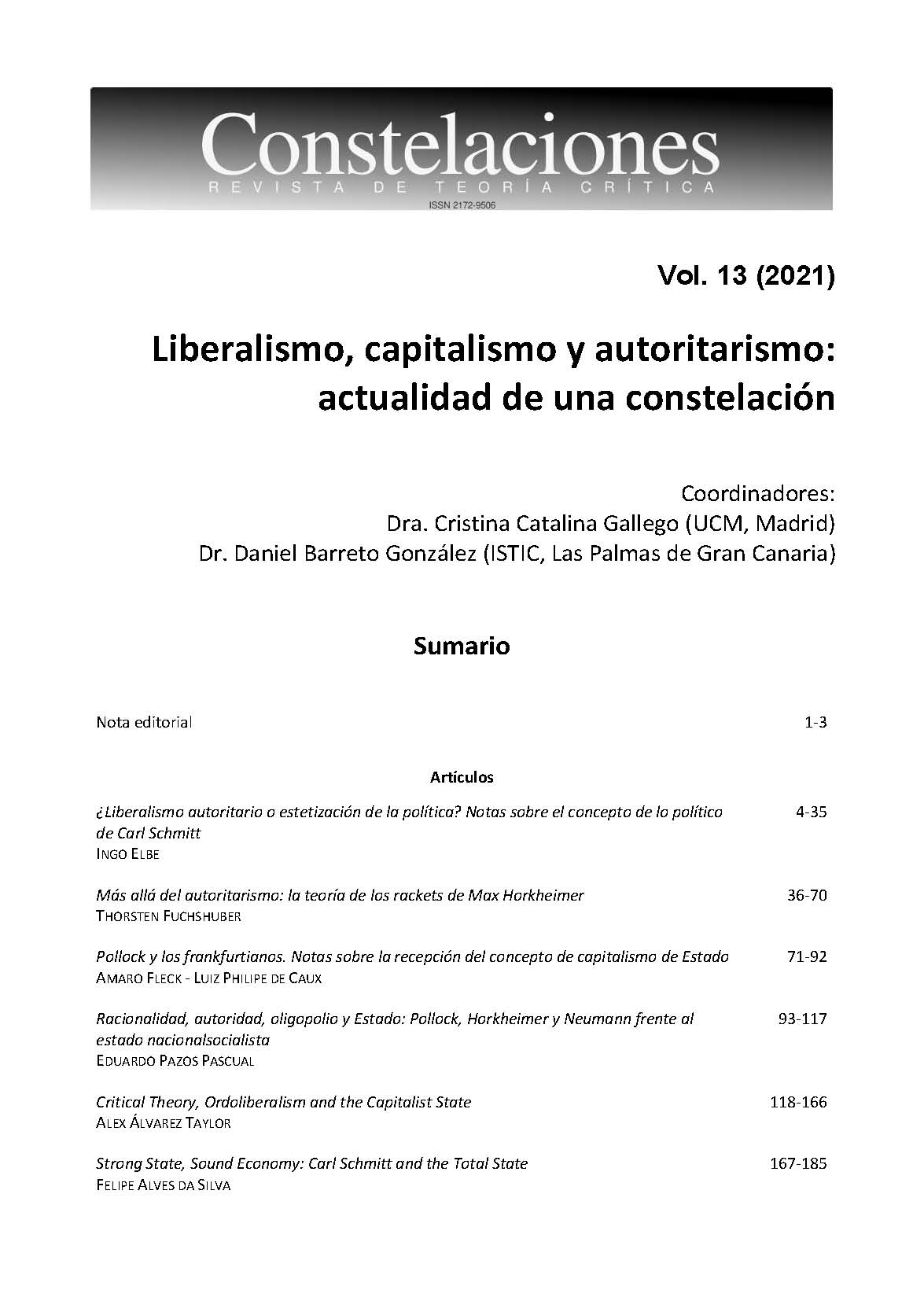Auschwitz como punto de desencuentro entre Th. W. Adorno y M. Foucault
Keywords:
dialéctica negativa, Auschwitz, biopolítica, protohistoria, genealogíaAbstract
In this article I will try to show the difficulty of accounting about the historical singularity of Auschwitz from Michel Foucault's biopolitical approaches. I will try to demostrate that genealogy gives meaning to something that has no meaning, and that the dialectical-negative treatment of Th. W. Adorno is a much more adequate interpretation, both for Auschwitz and for the present, than the dialectical-negative treatment of Th. W. Adorno. In addition, I will try to show that the warning of the impending catastrophe is only possible from the dialectical-negative approach of Th. W. Adorno's approaches.
Downloads
References
ADORNO, Th. W. (1996): Introducción a la sociología, Barcelona: Gedisa.
ADORNO, Th. W. (2003): Notas sobre literatura, Obra completa 11, Madrid: Akal.
ADORNO, Th. W. (2005): Dialéctica negativa, Obra completa 6, Madrid: Akal.
ADORNO, Th. W. (2006): Mínima Moralia, Obra completa 4, Madrid: Akal.
ADORNO, Th. W. (2019): Sobre la teoría de la historia y de la libertad, Buenos Aires: Eterna cadencia.
ADORNO, Th. W. (2020): Lecciones sobre dialéctica negativa, Buenos Aires: Eterna cadencia.
ALLEN, Amy (2016): The End of Progress. Decolonizing the Normative Foundations of Critical Theory, Nueva York: Columbia University Press.
ALLEN, Amy (2021): Critique on the Couch, Why Critical Theory Needs Psychoanalysis, New York: Columbia University Press.
BENJAMIN, Walter (2005): El libro de los Pasajes, Madrid: Akal.
BENJAMIN, Walter (2009): Estética y política, Buenos Aires: Las cuarenta.
BENJAMÍN, Walter (2021): Tesis sobre el concepto de historia y otros ensayos sobre historia y política, Madrid: Alianza Editorial.
CLAUSSEN, Detlev (2006): Theodor W. Adorno. Uno de los últimos genios, Valencia: Editorial Universidad de Granada.
CLAUSSEN, Detlev (2016): “Catástrofes civilizatorias, experiencia y teoría crítica de la sociedad” en Zamora, J. A., Mate, R., y Maiso, J. (Eds.), Las víctimas como precio necesario, Madrid: Trotta.
DELEUZE, Gilles (2014): El poder. Curso sobre Foucault, Buenos Aires: Editorial Cactus.
FOUCAULT, Michel (2001): Los anormales, Madrid: Akal.
FOUCAULT, Michel (2003): Hay que defender la sociedad, Madrid: Akal.
FOUCAULT, Michel (2005a): La sociedad punitiva, Madrid: Akal.
FOUCAULT, Michel (2005b): El poder psiquiátrico, Madrid: Akal.
FOUCAULT, Michel (2005c): Historia de la sexualidad, vol. 1., Madrid: Siglo XXI.
FOUCAULT, Michel (2008): Seguridad, territorio, población, Madrid: Akal.
HORKHEIMER, Max (1999): Materialismo, metafísica y moral, Madrid: Tecnos.
HORKHEIMER, M., y ADORNO, Th. W. (2018): Dialéctica de la Ilustración, Madrid: Ediciones Trotta.
KAFKA, F. (2012): Aforismos, Barcelona: Penguin Random House.
KESSLER, S. J. (2014): “Foucault and the Holocaust: Epistemic Shift, Liminality and the Death Camps”, Dapim: Studies on the Holocaust, Vol. 28, Nº. 3, 139-154.
MAISO, J. (2016): “Sobre la producción y reproducción social de la frialdad” en Zamora, J. A., Mate, R., y Maiso, J. (Eds.), Las víctimas como precio necesario, Trotta, Madrid.
MILCHMAN, A., y ROSENBERG, A. (1996): “Michel Foucault, Auschwitz and modernity”, Philosophy Social Criticism, vol, 22, nº 1, 101-113.
POSTONE, Moishe (2003): “The Holocaust and the Trajectory of the Twentieth Century”, en Postone, M., y Santer E., (Eds), Catastrophe and Meaning. The Holocaust and the Twentieth Century, Chicago: The University of Chicago Press, 81-114.
ZAMORA, J. A. (1997): “Civilización y barbarie. Sobre la Dialéctica de la Ilustración en el 50 aniversario de su publicación”, Scripta Fulgentina, Año VII/2, Nº 14, julio-diciembre, 255-291.
ZAMORA, J. A. (2001): “Th. W. Adorno y la aniquilación del individuo”, ISEGORÍA. Revista de Filosofía Moral y Política, Nº 28, 231-243.
ZAMORA, J. A. (2004): Th. W. Adorno. Pensar contra la barbarie, Editorial Trotta, Madrid.
ZAMORA, J. A. (2011): “Memoria e historia después de Auschwitz”, ISEGORÍA, Revista de Filosofía Moral y Política, Nº 45, 501-523.
ZAMORA, J. A. y MAISO, J. (2012): “Teoría crítica del antisemitismo”, Constelaciones. Revista de Teoría Crítica, nº 4, 133-177.
Downloads
Published
How to Cite
Issue
Section
License
Copyright (c) 2021 Guillermo Hernández

This work is licensed under a Creative Commons Attribution-NonCommercial-ShareAlike 4.0 International License.
Authors who have publications with this journal accept the following terms:
1. Authors will retain their copyright and grant the journal the right of first publication of their work, which will be simultaneously subject to the License of recognition of Creative Commons CC BY-NC-SA 4.0 that allows third parties to share, redistribute and adapt the work provided it is for non-commercial purposes and its author and first publication in this journal is indicated.
2. Authors may adopt other non-exclusive distribution license agreements for the version of the published work (e.g., depositing it in an institutional electronic archive or publishing it in a monographic volume) provided that the initial publication in this journal is indicated.
3. Authors are permitted and encouraged to disseminate their work via the Internet (e.g., in institutional telematic archives or on their website) before and during the submission process, which can produce interesting exchanges and increase citations of the published work. (See The Effect of Open Access).
Data confidentiality
1. Constelaciones. Revista de Teoría Crítica guarantees that the data you send us will only be used to meet the requests made in this message.
2. Your data will not be passed on to third parties.
3. You may request that your data be removed from our records at any time.





